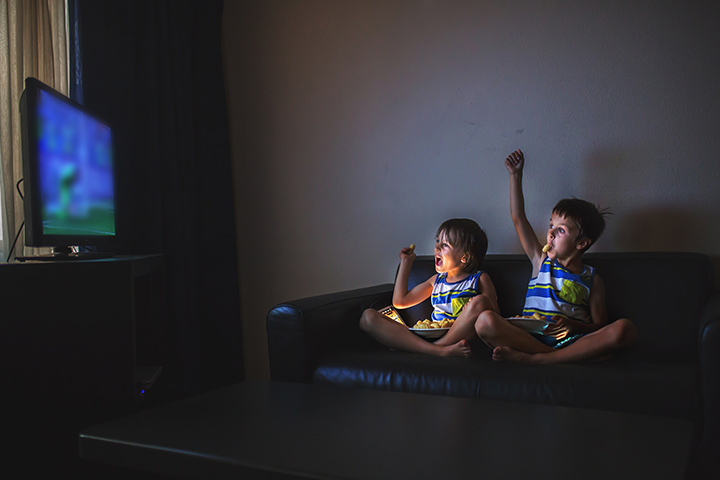
Image: iStock
As parents, most of us are guilty of plopping our kids in front of the television so that we can get some free time. Letting our kids watch some TV is probably one of the easiest and most effective ways to give ourselves a break. Because once the TV is turned on, kids will be laser-focused on what’s on the screen and stop creating a ruckus at home. Though it may have worked for us in the past, a recent study led by the University of Arizona says that parents of kids who are exposed to too much television may end up more stressed (1).
The study reveals that kids who watch too much television will be exposed to a lot of advertising that is showcased on television with just one purpose—to sell. Matthew Lapierre, lead study author and Eunjoo Choi, study co-author considers kids to be an easy target as they would have the instant urge to purchase the things they find appealing on TV. The study was based on a survey that involved 433 parents who had kids between the age group of 2 to 12 years. According to Lapierre, kids between this age group are easily persuaded, which led them to choose this age range.
Image: IStock
The findings showed that letting kids watch television did more harm than good since whenever they went out, kids insisted on buying particular items, and when the parents refused, they were more likely to throw a tantrum. The study suggests that this contributes to increased stress levels among parents that go beyond a single shopping experience (2).
Unlike before, when ads were limited to cable TV or networking, with the rise of streaming services, advertisers have become much more creative in using tactics that lure kids into buying their product by showing a particular narrative. So, whenever a kid is streaming, he/she is likely to see more integrated branding. Advertising that is aimed at kids generally features upbeat music, flashy characters, and bright colors. Since kids are easily persuaded, this form of tactic works well in their favor since kids are less likely to second guess or question the intent of the product, unlike adults. According to Lapierre, kids get easily excited by such advertisements since they lack the emotional and cognitive resources to second guess a product’s intent. So, whenever they find a product appealing, it could mean more stress for parents on the next shopping trip.
Ways To Reduce Shopping-Related Stress Among Parents
Image: IStock
One of the obvious ways parents can deal with this issue is by shutting off the TV and limiting screen time. But of course, this can be easier said than done. Lapierre says that commercial content aims at eliciting purchasing behavior in kids. So, besides the obvious solution, parents could also talk to their children about consumerism (3).
According to the researchers of the study, there are 3 ways of consumer-related communication that parents exhibit with their child:
Collaborative communication: In this type of communication, parents involve the child in purchasing by discussing with them and considering their opinion on certain brands or products.
Control communication: It is when a parent takes complete control in consumer-related discussions, which restricts the child from having any power over what to purchase.
Advertising communication: In this type of communication, parents try to educate children about advertising and consumerism. Parents attempt by telling them how advertising can be deceiving as they’ll tell you anything you want to believe to buy their products.
Image: IStock
According to Eunjoo Choi, collaborative communication was found to be more effective in managing the stress levels of parents. However, it was found that after a while, even this strategy stopped working, leading to more consumer conflicts between parents and kids. The other two types of communications were found to encourage more purchase initiations and coercive behavior in kids. This leads us to the question— what strategy should parents follow?
Too much screen time can be detrimental to both parents and kids. Hence one of the best ways to deal with it is to lead by example. You could set limited screen time and place certain ground rules in the house when it comes to watching television and using other gadgets. Encouraging your kids to pursue other activities such as board games, reading, and sports also helps in reduced screen time. You could also try to be more involved in your child’s life and make quality family time a priority.















